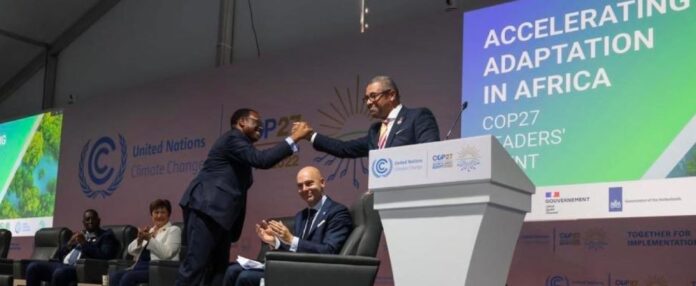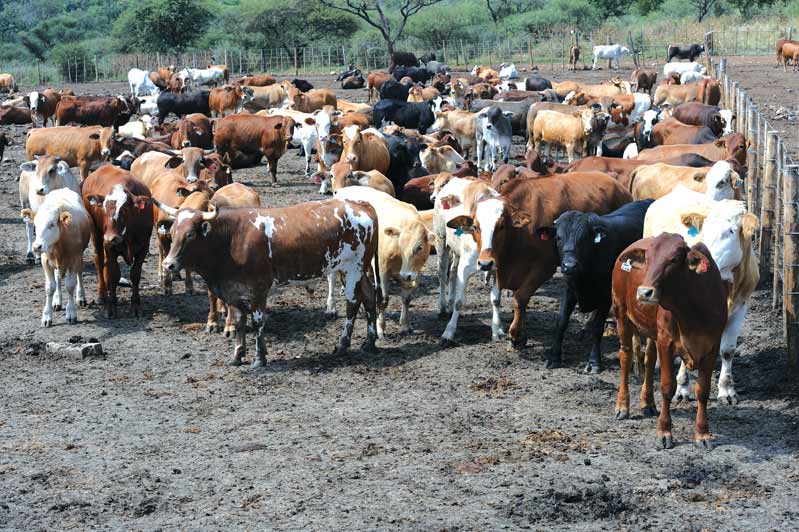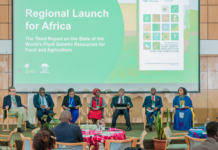Africa’s desperate search for durable and lasting adaptation and mitigation measures are drier than before because the continent is ‘being ‘short-changed by climate finance’, the African Development Bank says.
In a clarion call during the global conference COP 27 during the global conference COP 27 for urgent and unwavering mitigation measures to redress the loss and damage impacted on the continent.
Africa has in recent years, which has been dwarfed by the devastations of the flash floods and other environmental calamities which opened Sunday, the bank calls for climate finance to reverse the losses that threaten catastrophic consequences.
Bank’s President, Dr. Akinwumi Adesina, in his address to the delegates, minces no words in seeking urgent redress to the calamities that are befalling the continent stating that Africa is suffering from devastating effects of climate change, from droughts, floods, cyclones, locusts, and army worms.
Africa is further getting squeezed by climate change; distressed by climate change, and Africa is being short-changed by climate finance hence the call for urgent disbursement.
The Conference of Parties (COP), the 30th since inception and being hosted by Egypt, the third to be held by the African continent in the context of a global ‘polycrisis,’ has raised high expectations for the majority African inhabitants that seek financial interventions amid the crisis.
Estimates by the Pan African Financial Institution show that the cost of climate change in Africa is enormous, with the continent losing $7-15 billion a year spurred by climate change, projected to rise to $50 billion by 2050, according to a statement seen by FRA.
Africa, which accounts for just 3% of greenhouse gas emissions, is the least prepared to cope with its devastating effects. Arguably, an estimated 5 million Africans have presently been displaced by climate change.
Estimates by the International Panel on Climate Change show that Africa will heat up faster than any other region of the world.
This is against a background that the continent receives a paltry 3% of total climate finance globally, receiving a meager $18 billion per year, while its needs for climate finance are estimated at $125 billion per year, a situation that leaves the bank and other players concerned at the fate of the continent and its people that for long seek solutions.
Against a background of unfulfilled US$100 billion that remains unfulfilled since COP 15 with an additional US$20 billion pledged in climate finance the AfDB chief is worried at the ‘hurricane’ of calamities that threatens the face of the continent is not redressed arguing:
“Put bluntly, Africa is being short-changed by climate finance. Today, I carry the hues, the cries, the pains, the distress, and urgent call for action by a continent under siege of climate change.
“A call for decisive support to help Africa tackle climate change. We come not to beg, but to seek partnership for our efforts and drive. We are playing our part.”
The financial institution, which has remained instrumental in seeking durable adaptation and other mitigation measures over the years has to date pledged to double its climate finance to $25 billion by 2025. It commits 41% of its total financing to climate finance, exceeding its estimated target of 40%.
Dr. Adesina disclosed the Bank’s committal of 67% of all its climate finance to climate adaptation, the highest level globally on adaptation with and commends the United Nations for recognizing the financial institution’s unwavering recognition of its effort towards global climate adaptation.
AfDB and the Global Center on Adaptation launched the African Adaptation Acceleration Program (AAAP) with the goal of mobilizing $25 billion for climate adaptation in Africa, the largest effort globally on climate adaptation.
The African Development Bank has tabled US$12.5 billion before the developed nations and other possible financiers towards the fight against climate change and seeks the counterpart fund.
“We have come to the table with half of this amount ($12.5 billion). All we are asking for is “meet us halfway” to help Africa adapt to climate change that it did not cause.” He says
“Equity, fairness, and shared responsibility requires that developed countries provide the balance of $12.5 billion.”
Earlier, African Union Commission chairperson Moussa Faki Mahamat regretted the cost of COVID-19 pandemic and the Russia-Ukraine war on Government budgets with a call for relentless efforts to redress the pressing concerns, all surmountable.
“Work is going on across the continent—many governments have rolled out initiatives to address climate impacts and build resilience,” Mahamat said. “But the challenges are huge, and time is not on our side,” he told the audience. Mahamat called on member countries to remain steadfast in their fight for climate justice.
COP27, taking place in Sharm El-Sheikh, comes three decades after the United Nations Framework Convention on Climate Change (UNFCCC) was adopted and seven years since the Paris Agreement was agreed at COP21.
The conference under the strapline: ‘Together for implementation,’ has attracted world leaders, ministers, negotiators and other interest groups with some from Africa, all hoping to agree how to jointly address climate change and its impacts.
Key issues on the table for urgent resolve and fulfillment, after the Glasgow-COP 26 left Africa ‘unattended to’ include; Keeping the rise in global average temperature to ‘well below’ 2°C, and ideally 1.5°C, above pre-industrial levels.
There is a call for Strengthening the ability to adapt to climate change and build resilience and Align finance flows with ‘a pathway towards low greenhouse gas emissions and climate-resilient development’.
Under the Paris Agreement there is a general consensus for a ‘bottom-up’ approach where individual countries decide what action they will take.








